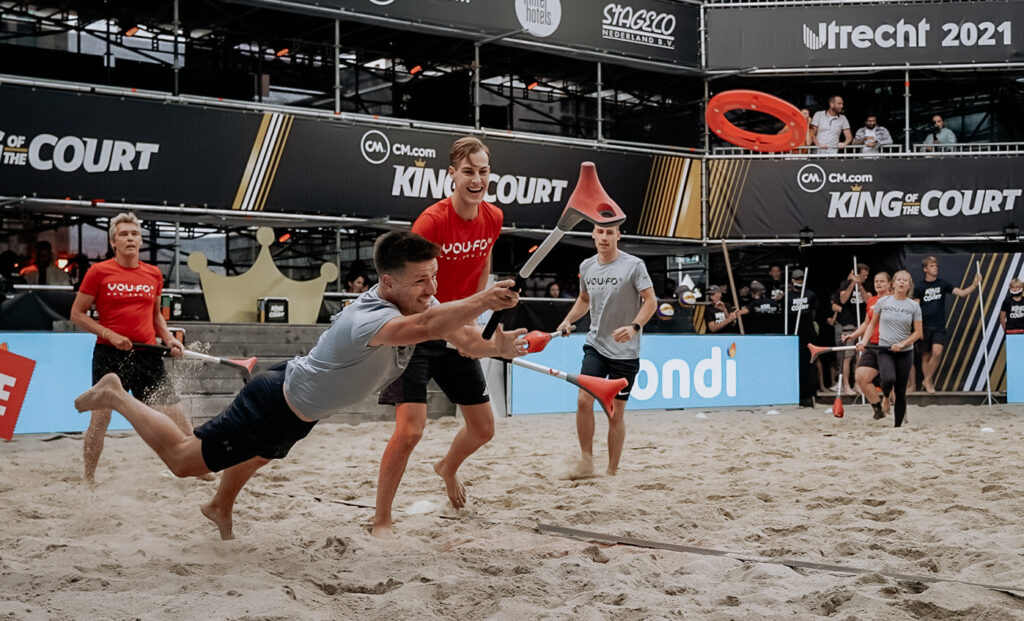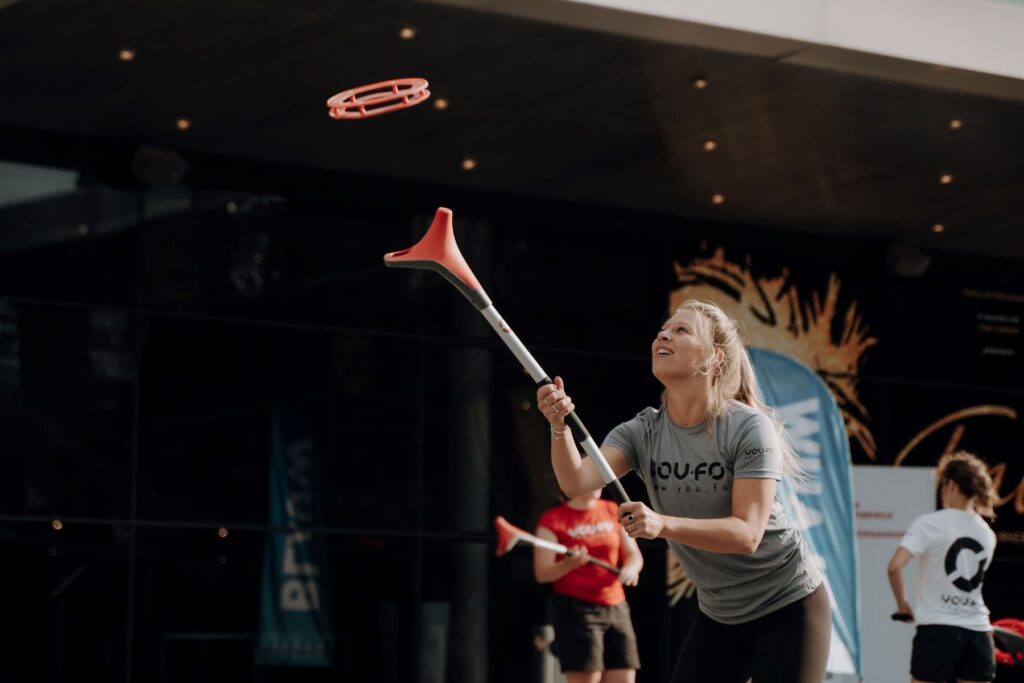A rubber ring flies through the air, launched by someone with a stick where that same ring rested on the end of it just a second ago. A teammate plucks the ring from the air with a similar stick and tries to bring it to the end zone. YOU.FO is the sport. And the inaugural World Cup is just around the corner, on June 18 in the Netherlands.

It may sound complicated and some international participants say it is just that when you first pick up the stick. Ross Murphy, an Irish physical education teacher at a school in Berlin: “It is so cool, but I was terrible at it the first ten minutes! I didn’t like that feeling, because I’m not used to be the one that’s bad in sport.” And Katsuaki Takizawa from Japan: “It looks really weird. People didn’t even know how to start and what to do with it.” Or Kristin Gilmore, a teacher from the United States: “I struggled about five minutes with it, because it was a different skill for me. But I immediately loved it and thought it would be great to teach the kids, my students.”
The enthusiasm drives them to Den Bosch, the Netherlands, to compete at the World Cup on June 18. Dutchmen Bas Ruyssenaars and Giel Bos begin developing the sport in 2015. Originally based on the idea of Ruyssenaars who walked his dog, playing the old ‘I throw a ring, you bring it back to me’-game. “I wanted to create something that people enjoy, see if I could really turn it into a game, a sport.” After years of thinking, researching, developing and inventing, they succeeded. YOU.FO, a sport involving a stick and an ‘unidentified flying object’ that you don’t recognize and swings into the air, is played at the World Cup in a three vs. three format. Points are scored by moving the ring to the other side of the field, catching it on the stick in the end zone.
“It’s a weird combination of ultimate frisbee and American football,” says Murphy. “And you can add stick-related sports like hockey, lacrosse to it. And off course the Irish sport hurling. Obviously played with a ball, but the stick handling has the same basics.” At the same conference where the 25-year old Murphy was introduced to the sport, the ECIS Physical Education in Frankfurt last April, he immediately tried to get the stick and the ring under control.

“The next day I left another workshop at the conference to do YOU.FO again… I got competitive, became pretty good at it and Giel [Bos] invited me to form an Irish team and come to the World Cup.”
Potential
Important for Murphy and also for the American team is the great potential the sport has for a younger generation. Team USA, existing of three PE-teachers from Colorado (besides Gilmore, Cody Owston and Ryan Stewart), see kids picking up the sport quite easily. “When we play in a park and we ask adults to play with us, they say: ‘Not a chance I’m going to pick up that stick’,” says Owston. “Where as kids jump right in and are wanting to play along.” Stewart recognizes that enthusiasm at his school. “The kids who are good at it and having fun with it are not necessarily the athletic types you always expect. That’s very cool to see.”
Gilmore adds: “We want YOU.FO to be picked up through out the entire school district. That way when Ryan’s kids from elementary school come to my middle school they already know the game.” She particularly likes how accessible the sport is. “I make the connection with lacrosse as being an American sport kids may know. And I explain that I wasn’t that good the first time I picked up a stick. There’s a lot of value to teach kids to learn a new sport and that it’s ok to struggle with it a bit at first.”
Claiming the ring
Part of the accessibility of the sport in match format is the claiming of the ring when it hits the ground. Murphy: “That way there is no consequence if you don’t catch the ring. It’s not a foul. If you put you’re stick in the ring you can continue to play.” It is part of the self-organizing capacity of the sport, an important part that the Dutchmen Ruyssenaars and Bos have thought about carefully. “With frisbee, for example, children sometimes prefer not to receive the frisbee because they are afraid of dropping it”, says Bos. “At YOU.FO you can continue playing right away.
Furthermore, there are no referees, there are no alignments. It is exciting for us to see how that works out at a World Cup, but we do believe in such a concept. Just like you don’t have to be a member of an association to play. You can find players by an app and start playing YOU.FO in a park. And we are inclusive: young and old play together, men and women. Everyone can form a team and participate in this open World Cup.”

Just like the teachers want to bring the sport to their schools and promote YOU.FO from that system, the 30-year-old Japanese Takizawa, pianist in daily life, wants to try the same through his sports club. He is affiliated with Sports World Tokyo, an association that plays new sports every month. “One time we play cricket for a while, then korfball, which is very popular in the Netherlands, but we don’t really know. And now we play YOU.FO.
We train twice a week to be able to practice the sport properly and we are ready for it! When I get back to Japan I definitely want to try to see if we can set up a Japan Cup or an Asian Cup, for example.”
The World Cup YOU.FO is a result of years of pioneering and figuring out how to set up a sport, but it is also a new stepping stone to grow further. A booster in which an Irish teacher in Berlin, three sports-loving American teachers from Colorado and a pianist from Tokyo play their role.